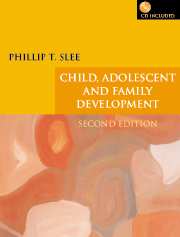Book contents
- Frontmatter
- Contents
- List of Trends and issues
- List of Family life-cycles
- List of Figures and Tables
- Note to the Student
- Note to the Instructor
- How to use the CD-ROM
- Acknowledgements
- Introduction
- Part 1 The Study of Human Development
- Part 2 Conception and Birth
- 4 Prenatal Development
- 5 From Conception to Birth
- Part 3 Infancy
- Part 4 Toddlerhood
- Part 5 The Pre-school Years
- Part 6 Middle Childhood
- Part 7 Adolescence
- Part 8 Studying Human Development
- Glossary
- References
- Index
- STUDENT FEEDBACK FORM
4 - Prenatal Development
from Part 2 - Conception and Birth
- Frontmatter
- Contents
- List of Trends and issues
- List of Family life-cycles
- List of Figures and Tables
- Note to the Student
- Note to the Instructor
- How to use the CD-ROM
- Acknowledgements
- Introduction
- Part 1 The Study of Human Development
- Part 2 Conception and Birth
- 4 Prenatal Development
- 5 From Conception to Birth
- Part 3 Infancy
- Part 4 Toddlerhood
- Part 5 The Pre-school Years
- Part 6 Middle Childhood
- Part 7 Adolescence
- Part 8 Studying Human Development
- Glossary
- References
- Index
- STUDENT FEEDBACK FORM
Summary
I Happy Am
I have no name:
I am but two days old.
I happy am
Joy is my name
Sweet joy befall thee!
William Blake, Songs of InnocenceKEY TERMS AND CONCEPTS
Conception
Genetics
Chromosomes
Genes
DNA
Mitosis
Meiosis
Dominant and recessive alleles
Phenotype
Genotype
Monozygotic twins
Dyzygotic twins
Genetic defects
Reaction range
Canalization
Niche picking
Genetic counselling
Preformist
Empiricist
Selectionist
The family as a system
Introduction
Since the first edition of this textbook was published in 1993, considerable development has taken place in our understanding of the influence of genetics on human development. In this second edition, the focus is upon describing the nature of some of these significant gains and highlighting the implications for developmental psychology.
Between the time a baby is conceived and born, she or he has been subjected to nine months of genetic and environmental influence. Medical science has made considerable advances in identifying the likely effects of cigarette smoking, alcohol consumption and stress on the newly conceived child's development and these will be examined in chapter 5. In this chapter, consideration is given to the contribution that heredity and environment make to the foetus's development. In The Family Life-cycle: 4, the view of the family as a ‘system’ is discussed.
Trends and issues
Traditional Aboriginal views of conception
Hamilton (1981) describes traditional Australian Aboriginal views of conception in some detail. In her study of Arnhem Land Aborigines, she notes three basic explanations for conception:
Pregnancy is caused by spirit children in different places, such as a waterhole. Certain places are known by Aborigines to be plentiful in spirit children and only a woman who wants a child will approach such a location. […]
- Type
- Chapter
- Information
- Child, Adolescent and Family Development , pp. 81 - 99Publisher: Cambridge University PressPrint publication year: 2002



